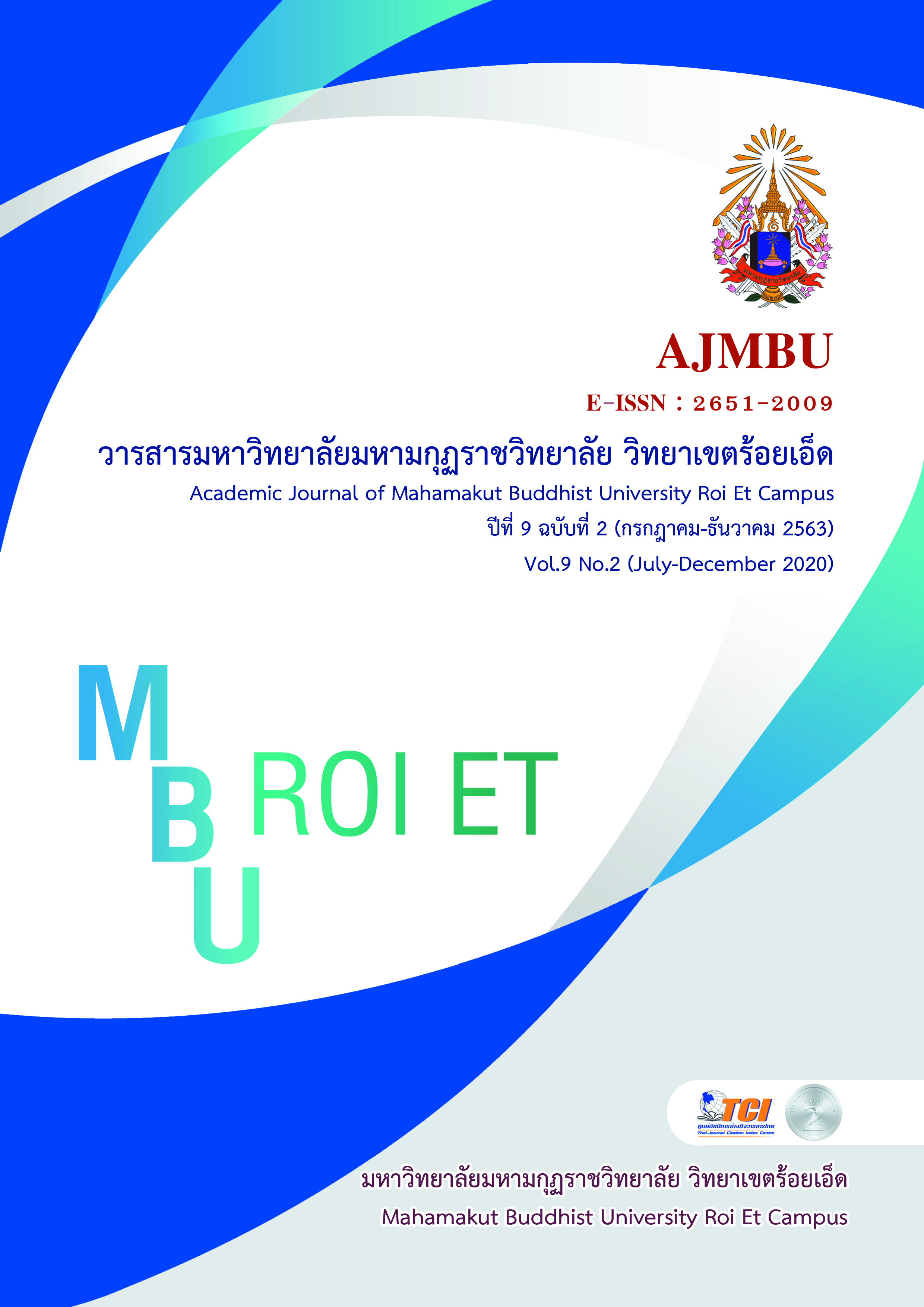The Development of Training Curriculum of Student Leaders in Small-Size Secondary School under Secondary Educational Service Area Office 22
Main Article Content
Abstract
The objectives of the research article were to 1) construct the training curriculum of student leaders, 2) compare the understanding of student leaders about taking notes and meeting minutes before and after training, 3) study the student leaders’ practical skills on taking notes and meeting minutes, 4) study the student leader satisfaction towards the training curriculum, and 5) to follow-up the understanding and performance of student leaders about taking notes and meeting minutes a month after training.The research process were divided into four step ; step 1, study the related documents and research, step 2, training curriculum construction, step 3, experiment training curriculum, and step 4, training curriculum improvement. The research samples consisted of 14 leader students of Chiangyuenwittaya School, Tha Uthen District Nakhon Phanom Province under Secondary Educational Service Area Office 22. They were randomly selected. Percentage, mean, standard deviation and t-test for dependent samples were used for data analysis.
The research findings were: 1) The training curriculum on health promotion for student leaders consisted of four factors, which were 1) rational and background, 2) course objectives, 3) content, 4) training measurement and evaluation. 2)The understanding about taking notes and meeting minutes of student leaders after training was higher than before training with statistically significant at .01. 3) The student leaders’ practical skills about taking notes and meeting minutes were at the highest level. 4) The satisfaction toward the training curriculum of student leaders was highly positive. 5)The understanding about taking notes and meeting minutes of student leaders a month after training was not different from after training with statistically different at the level of .01.
Article Details
References
จักรา วงศ์กาฬสินธุ์. (2556). การพัฒนาหลักสูตรฝึกอบรมโดยใช้หลักการเจริญสติปัฏฐาน 4 ตามแนวทางของหลวงพ่อเทียน จิตตสุโภ เพื่อเสริมสร้างความสามารถในการจัดการอารมณ์ ของนักเรียนชั้นมัธยมศึกษาปีที่ 2 โรงเรียนสกลนครพัฒนศึกษา สำนักงานเขตพื้นที่การศึกษามัธยมศึกษา เขต 23. วิทยานิพนธ์ครุศาสตรมหาบัณฑิต. สาขาวิชาหลักสูตรและการสอน : มหาวิทยาลัยราชภัฏสกลนคร.
ใจทิพย์ เชื้อรัตนพงษ์. (2539). การพัฒนาหลักสูตร : หลักการและแนวปฏิบัติ. กรุงเทพมหานคร : อลีนเพลส.
ชัญญาภัค วงศ์บา และ กิ่งกาญจน์ จงใจหาญ. (2555). ประเมินผลการฝึกอบรมตามโครงการ CHAMPION โดยประยุกต์ใช้แนวทางการประเมินของเคิร์กแพทริค. วารสารสำนักงานป้องกันควบคุมโรคที่ 6 จังหวัดขอนแก่น. 19(1). 27-38.
ชูชัย สมิทธิไกร. (2554). การฝึกอบรมบุคลากรในองค์การ. พิมพ์ครั้งที่ 7. กรุงเทพมหานคร : สำนักพิมพ์แห่งจุฬาลงกรณ์มหาวิทยาลัย.
พิสณุ ฟองศรี. (2549). การประเมินทางการศึกษา : แนวคิดสู่การปฏิบัติ. พิมพ์ครั้งที่ 2. กรุงเทพมหานคร : เทียมฝ่าการพิมพ์.
นิติกร คำชุม. (2559). รายงานการประเมินตนเองโรงเรียนเชียงยืนวิทยา ประจำปีการศึกษา 2559. นครพนม : กลุ่มแผนงานและงบประมาณ.
วาโร เพ็งสวัสดิ์. (2551). วิธีวิทยาการวิจัย. กรุงเทพมหานคร : สุวีริยาสาส์น.
วิชัย วงษ์ใหญ่. (2543). กระบวนทัศน์ใหม่ในการพัฒนาหลักสูตร. กรุงเทพมหานคร : โอเดียนสโตร์.
วิชาญ พันธุ์ประเสริฐ. (2543). การพัฒนาหลักสูตรฝึกอบรมครูวิทยาศาสตร์เพื่อออกแบบบทปฏิบัติการที่สอดแทรกภูมิปัญญาท้องถิ่น. ปริญญานิพนธ์การศึกษาดุษฎีบัณฑิต. สาขาวิชาวิทยาศาสตร์ศึกษา : มหาวิทยาลัยศรีนครินทรวิโรฒ.
สำนักงานคณะกรรมการการศึกษาขั้นพื้นฐาน. (2555). หลักและแนวทางในการดำเนินงานสภานักเรียน. กรุงเทพมหานคร : สำนักพัฒนากิจกรรมนักเรียน.
อรวรรนี ไชยปัญหา. (2556). รูปแบบการพัฒนาภาวะผู้นำของผู้บริหารโรงเรียนขนาดเล็ก. วิทยานิพนธ์ ปรัชญาดุษฎีบัณฑิต. สาขาการบริหารและพัฒนาการศึกษา. สกลนคร : มหาวิทยาลัยราชภัฏสกลนคร.
Flippo, E. B. (1970). Management : A Behavioral Approach. Boston : Allyn and Bacon.
Taba, H. (1962). Curriculum Development : Theory and Practice. New York : Horcourt : University of Chicago Press.


